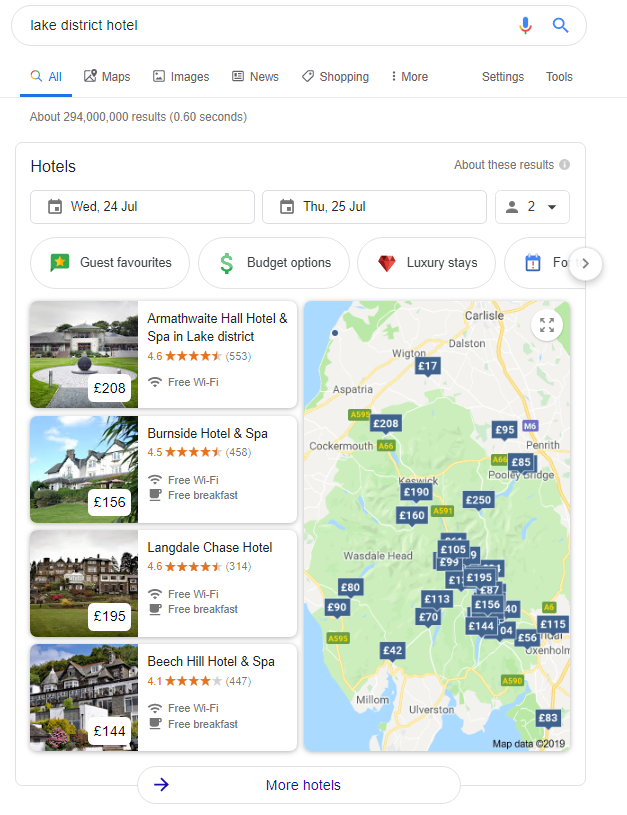7 SEO Tips for Hotel Owners
There are many ways you can market your hotel, but one of the best ways is through increasing your visibility in search engines and attracting guests from users searching in Google. Here are some of our seo tips on how you can optimise your website to get more guests at your hotel.
1. Keyword Research
Before you optimise your website, you need to research the phrases the guests may use to find your Hotel.
Guests won’t just be searching for the name of your hotel. They’ll likely be searching for location-specific keywords. For example, “Hotel in the Lake District”.
You should assess the competition before choosing which search term you will choose as your primary keyword. “Hotel in the Lake District” might have too much competition for your budget. If so, then you could consider a more specific location such as “Hotel in Windermere”.
Research any potential phrases that users may search to find your hotel website. Note any that have monthly search volume.
2. Include Keywords in Content, Title Tag and Header
Once you’ve decided which keywords you’re going to target, you should map these out against certain pages of your website. The strongest keywords that you target will be included on your homepage.
Once you know your key phrases, make sure to include these in the title tag, header and content of your page.
- You should only have one <h1> tag per page, this should include your primary keyword.
- Your title tag shows 65 characters in the SERPs, so there is an opportunity to include a couple of keywords and the name of your hotel.
- Your content is the perfect place to target more longtail keywords and features that your hotel may offer. For example, if you’re dog-friendly or have a hot tub.
3. Include Special Offers or Features in Meta Descriptions
Meta Descriptions are short snippets of up to 156 characters that appear under your website in the SERPs. These do not directly impact your SEO rankings but they are a good opportunity to say something interesting to entice users to visit your website.
For example, if you offer a special discount for bookings over a certain duration then you can advertise this in your meta description.

4. Set Up Local Maps Listings
You need to have your hotel added to local maps listings to help you get the most visitors to your website.
Google Maps is often used by potential guests when looking for a place to stay. If a user searches on Google Maps for “Lake District Hotel” and your website does not appear, you could be missing out on hundreds of guests.
Websites that are registered with Google My Business also appear at the top of the SERPs in the Google ‘local pack’. This will show the most relevant results for your search term. If you’re not registered on maps, your hotel will be ineligible to appear here.

Google Maps isn’t the only map where you should list your hotel. Bing and Apple Maps are also used by potential guests depending on their device and browser preferences. You should register to all three of these to help your website appear in maps results.
5. Build Local Citations
One of the most important factors for ranking a website is the number of other websites that link to yours. An important element of your hotel’s SEO plan should be to list your hotel in a range of directories and online resources.
Search for websites that are specifically related to the hospitality industry and set up a listing for your hotel. In addition to this, set up listings for national directories and local resource websites.
For example, if hotels in The Lake District could set up a listing on GoLakes.co.uk.
6. Consistent NAP
Having a consistent name, address and phone number for all your hotel listings is an important local SEO ranking factor.
If you have lots of slight variations across your listings, this can lead to Google or users being confused and thinking that your listings are for different hotels. This will dilute the SEO power of your website.
Make sure any inconsistencies are corrected so that Google can attribute all the value from your local citations to your hotel.
7. Page Load Speed
The page speed of your website is an SEO ranking factor that has grown in importance in recent years.
Not only does it impact SEO, but slow websites can also leave users frustrated and unlikely to complete a holiday booking. Ensure that your website is coded in a way that does not use excessive code and slows the page down. Minify CSS and JavaScript files to save load time and consider an agency experienced in hotel website development to build the website.
Finally, make sure that any images you upload on your website are compressed and optimised for speed. High-quality images a great way to showcase your hotel, but if each image is 1MB this will greatly slow down your website.


